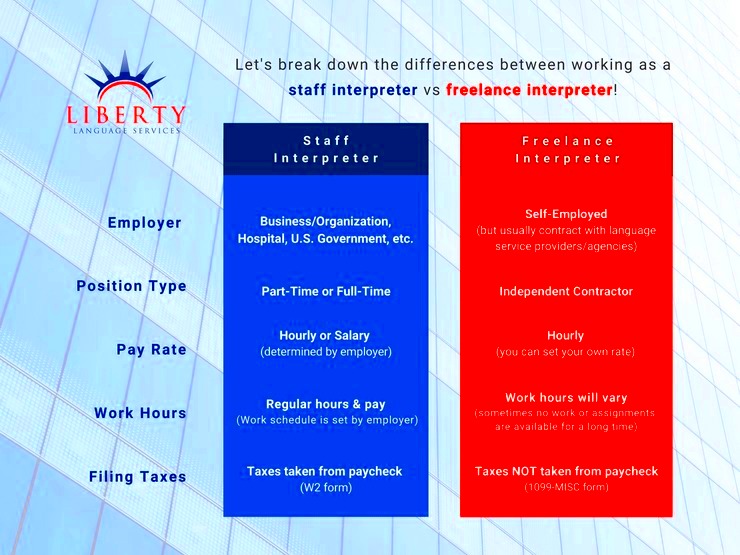Freelance interpreters play a crucial role in breaking down language barriers and helping people communicate across cultures. But how much can they earn? The answer isn't simple, as their income depends on various factors. Freelancers have the flexibility to set their rates, but these rates can vary based on experience, the languages they specialize in, and the platforms they use to find clients. Understanding these factors is essential for interpreters to make informed decisions about their careers and income expectations.
Factors That Influence Freelance Interpreter Income

The income of a freelance interpreter is influenced by several key factors. Below are the most important ones:
- Experience: More experienced interpreters typically charge higher rates because they have a proven track record of providing high-quality services.
- Language Pair: Some languages, especially rare ones, can command higher rates due to limited availability of qualified interpreters.
- Specialization: Interpreters who specialize in specific fields, such as medical or legal interpreting, can charge more for their expertise.
- Location: Interpreters working in large cities or international hubs may have access to higher-paying opportunities compared to those in smaller regions.
- Demand: High demand for interpretation services in certain industries or events can drive up rates.
- Platform: The platform or agency an interpreter works with can impact their earnings, as some platforms may take a commission or set fixed rates.
Also Read This: How to Cancel Your Fiverr Account: A Step-by-Step Guide
Average Pay for Freelance Interpreters

The average pay for freelance interpreters can vary significantly depending on various factors like the type of work and the region. Here’s an overview of average rates based on different criteria:
| Type of Interpretation | Average Rate per Hour |
|---|---|
| General Interpretation | $20 - $50 |
| Medical Interpretation | $30 - $75 |
| Legal Interpretation | $40 - $100 |
| Simultaneous Interpretation | $50 - $150 |
As you can see, specialized fields like legal or medical interpretation tend to pay more due to the skills and knowledge required. Freelance interpreters who focus on simultaneous interpretation (where they translate in real-time) often earn higher hourly rates as well. Rates also vary based on location, with interpreters in larger cities earning more compared to those in smaller towns. Additionally, interpreters who have certifications or extensive experience in specific industries can expect to charge higher fees.
Also Read This: How to Delete Your Account on Fiverr
Differences in Rates by Language and Specialization

The rates freelance interpreters can charge often depend heavily on the language pair they work with. Rare or in-demand languages typically command higher rates because fewer interpreters are qualified to work with them. For example, interpreters working with languages like Japanese, Arabic, or Mandarin may charge more compared to those working with more commonly spoken languages like Spanish or French.
Additionally, specialization plays a big role in determining rates. Interpreters who focus on specific fields, such as legal, medical, or technical interpretation, often earn more due to the expertise and knowledge required in these areas. Here's a breakdown of how language and specialization can impact rates:
- Rare Languages: Interpreters working with languages like Mandarin, Arabic, or Korean often earn higher rates due to the limited pool of qualified interpreters.
- Common Languages: Languages such as Spanish, French, or German may have lower rates due to a larger number of interpreters available.
- Medical Interpretation: Requires specialized knowledge of medical terminology, often commanding rates between $30 to $75 per hour.
- Legal Interpretation: Interpreters specializing in legal settings, such as courtrooms, earn higher rates, usually ranging from $40 to $100 per hour.
- Technical Interpretation: Specialized fields like engineering or IT may also require higher rates, particularly for interpreters who understand complex technical jargon.
So, choosing a specialized field or a rare language can help interpreters increase their earning potential significantly.
Also Read This: How to Search Someone on Fiverr: A Comprehensive Guide
How Experience Affects Freelance Interpreter Pay

Experience is one of the most important factors when it comes to determining how much a freelance interpreter can charge. Just like in any other field, the more experience an interpreter has, the more they can typically earn. Experienced interpreters have honed their skills, gained certifications, and built a solid reputation that can attract higher-paying clients.
Here are a few ways experience influences pay:
- Higher Rates: Experienced interpreters often have the confidence and expertise to charge higher rates. They have worked with various clients and handled different types of interpretations, making them more valuable to clients.
- Repeat Clients: As interpreters gain more experience, they often build long-term relationships with clients, which can lead to more consistent work and higher-paying opportunities.
- Specialized Knowledge: Experienced interpreters who specialize in certain fields (such as legal or medical) can demand higher fees due to their extensive knowledge of specific terminology and protocols.
- Reputation: A solid reputation in the industry can lead to higher-paying jobs, as clients are willing to pay more for an interpreter with proven skills.
While entry-level interpreters may start with lower rates, over time, with consistent work and experience, they can gradually increase their charges and find higher-paying opportunities.
Also Read This: How to Change Your Phone Number on Fiverr
How Freelancers Can Increase Their Earnings
Freelance interpreters looking to increase their earnings have several strategies they can use. The key to boosting your income lies in improving your skills, finding more clients, and diversifying your services. Below are some ways interpreters can work towards higher pay:
- Specialize in a Niche: By focusing on a specific field, like legal or medical interpreting, you can command higher rates because of your expertise.
- Get Certified: Obtaining certifications, such as the ATA (American Translators Association) certification or a medical interpreting certification, can make you more competitive and help you charge higher rates.
- Expand Your Language Pairs: If you are proficient in one language, learning additional languages can open up more opportunities for work. Rare language pairs often have a higher earning potential.
- Increase Your Availability: Offering your services during peak times, such as during international conferences or events, can help you secure higher-paying assignments.
- Network and Market Your Services: Building a network and consistently marketing your services can help you find clients who are willing to pay higher rates. Online platforms like Fiverr, LinkedIn, or interpreting agencies are great places to start.
- Offer Remote Services: With remote interpreting on the rise, offering virtual interpreting services can help you expand your client base, allowing you to work with clients from all over the world.
By investing in professional development and taking steps to market themselves effectively, freelance interpreters can increase their earnings and secure higher-paying projects.
Also Read This: Why is My Fiverr Account Disabled? Understanding the Reasons and Solutions
Common Platforms for Freelance Interpreters
Freelance interpreters often turn to online platforms to find clients and build their careers. These platforms provide a convenient way to connect with individuals and businesses looking for language services. Some platforms specialize exclusively in interpretation, while others offer a broader range of freelance services. Here are some popular platforms where freelance interpreters can find work:
- Fiverr: Fiverr is a popular platform where freelance interpreters can create gig listings and offer their services at various price points. It’s a great platform for building a client base and getting started.
- Upwork: Upwork is a well-known freelancing platform that connects interpreters with clients in need of language services. Freelancers can apply to job postings, negotiate rates, and set up long-term relationships with clients.
- ProZ: ProZ is specifically tailored for translators and interpreters. It’s a great platform for finding high-quality clients and offers features such as job boards and networking opportunities.
- TranslatorsCafe: TranslatorsCafe is another niche platform for language professionals. It includes job listings and forums for discussing industry trends and best practices.
- Gengo: Gengo is a translation and interpretation platform that focuses on providing affordable, professional language services. Freelance interpreters can find both one-time and ongoing work.
By using these platforms, freelance interpreters can reach a wide range of clients, build their portfolios, and increase their chances of securing consistent, high-paying work.
Also Read This: Can We Ask for Reviews on Fiverr?
Frequently Asked Questions (FAQ)
As a freelance interpreter, you might have questions about rates, platforms, or how to grow your career. Below are some frequently asked questions that can help clear up common doubts:
- What is the average rate for a freelance interpreter?
Rates vary based on language, specialization, and experience. On average, interpreters can charge anywhere from $20 to $150 per hour, with specialized fields like legal or medical interpretation commanding higher rates. - Do I need a certification to be a freelance interpreter?
While certification is not always required, it can help you stand out and charge higher rates. Certifications such as those from the ATA (American Translators Association) or specific legal and medical certifications are highly valued in the industry. - How can I find clients as a freelance interpreter?
To find clients, you can use online platforms like Fiverr, Upwork, or ProZ. Networking, attending industry events, and getting referrals from past clients also help build a steady stream of work. - What are the best languages to work with as an interpreter?
Rare languages like Mandarin, Arabic, and Japanese tend to offer higher pay rates because of the limited number of interpreters available. However, widely spoken languages like Spanish or French can also provide consistent work opportunities. - Can I work remotely as a freelance interpreter?
Yes, many freelance interpreters work remotely, especially with the rise of video conferencing tools. Remote work expands your client base and allows you to work from anywhere.
Conclusion
Freelance interpreting is a rewarding career that offers flexibility, variety, and the potential for high earnings. While income can vary based on factors like language pair, specialization, and experience, there are many opportunities to increase your earnings by gaining certifications, specializing in a niche, or using online platforms to find clients. Platforms like Fiverr, Upwork, and ProZ are great tools for connecting with clients and building your portfolio. By focusing on developing your skills, marketing your services, and maintaining a strong reputation, you can enjoy a successful freelance interpreting career.




